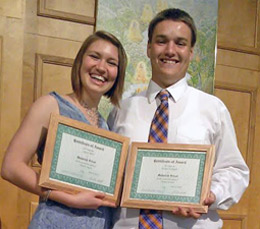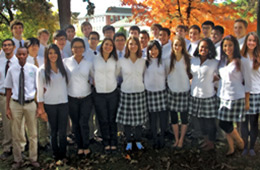It’s graduation day at Maharishi School. The seniors are dressed in white caps and gowns and will soon receive their diplomas. The valedictorian and the salutatorian have been announced. But there is one more award unique to Maharishi School, the Pioneer Award. Considered the highest honor, it is given to one senior boy and one senior girl who exhibit excellence and balance in all areas of life. The award acknowledges the development of consciousness, which is the basis of education at this school.
In this interview, Leanna Miller reflects on the meaning of the Pioneer Award and how Maharishi School helps students achieve their full potential.
Christine: Why is the Pioneer Award considered the highest honor at Maharishi School?
 Leanna: The award represents a student who strives for 200 percent of life—100 percent inner fulfillment and 100 percent outer success and fulfillment. The recipient may not be the student with the best grades, but one who is well-rounded and tries to be the best person they can be.
Leanna: The award represents a student who strives for 200 percent of life—100 percent inner fulfillment and 100 percent outer success and fulfillment. The recipient may not be the student with the best grades, but one who is well-rounded and tries to be the best person they can be.
Christine: How do you define “well-rounded”?
Leanna: Somebody who is well-rounded has a broad understanding of life and the ability to do well in many fields. The award highlights grades, extracurricular activities, a respectful attitude towards teachers and classmates, and regular practice of the Transcendental Meditation (TM) technique. This award recognizes a student’s overall development.
Christine: How does this school help students maintain balance in life?
Leanna: The school policy upholds an important principle: Rest and activity are the steps to progress. We go to school and study, we play sports and do homework, and we participate in a speech or dance group, or the Destination Imagination national competition for creativity. Yet each day at school, there is time set aside for deep rest through our TM practice. We gain deep rest when we practice TM so we can be successful in activity.
“People often get upset over little things because of built-up stress. When you practice TM, you are relieving stress every day, so you can approach the day on an even keel.” —Leanna Dawn Miller, Maharishi School senior
Christine: In your acceptance speech you talk about the cultural diversity at the school and how well everyone gets along. Why do you think your classmates get along so well, even with the ethnic and cultural differences?
Leanna: It’s been my experience that practicing TM gives me emotional stability and balance. When I’m feeling balanced, I have a clearer head and can deal with problems before they become conflicts. I think many of the students feel that when they are more aware, they can catch an issue when it first starts to arise.
People often get upset over little things because of built-up stress. When you practice TM, you are relieving stress every day, so you can approach the day on an even keel. TM doesn’t stop us from having disagreements, but it does provide clarity of mind, allowing us to navigate through challenging situations with more ease and stability.
Christine: How have you grown since coming to Maharishi School in the fifth grade?
 Leanna: I came to the school as a very insecure little girl. I would do silly things to get people to like me. That was a problem I had at my school back in Massachusetts. I had an issue with being bullied because I wanted the people who didn’t like me to be my friends.
Leanna: I came to the school as a very insecure little girl. I would do silly things to get people to like me. That was a problem I had at my school back in Massachusetts. I had an issue with being bullied because I wanted the people who didn’t like me to be my friends.
At Maharishi School, I not only had my own mother and father to support me at home, but the teachers also became like mothers and fathers at school. I felt truly loved and cared for by my teachers. Having that feeling at school and at home was important to me, because school became a second home. I needed that nurturing for my heart.
As my awareness became more and more developed, I gained inner strength, so I was not so easily unsettled by bad experiences. I became good at letting those things go and dealing with the situation (well, most of the time, anyway). TM gives us a broader awareness, so we see things more clearly and are able to react more intelligently. I became a stronger person, learned to love myself, be true to myself, and not need everyone to like me.
“By meditating regularly, we gain the ability to have settled awareness even when we are engaged in life, at work or school. We can experience our inner Self even while being very active.” —Leanna Dawn Miller
Christine: How does TM help people in daily life?
Leanna: People who don’t know about TM may think that experiencing their inner Self and living life actively in the world are two separate things. It doesn’t have to be that way. In fact, with TM it’s not that way. By meditating regularly, we gain the ability to have settled awareness even when we are engaged in life, at work or school. We can experience our inner Self even while being very active. That’s what we mean when we talk about living 200 percent of life.
Christine: How has your school helped you to live life more fully?
 Leanna: Of course I feel tired sometimes, but I feel like I couldn’t live the life I want to live without my TM practice. I want to do so much and give back to the world. I couldn’t do that unless I had this technique to help me center myself and get deep rest. You need to be strong and awake to accomplish things in life.
Leanna: Of course I feel tired sometimes, but I feel like I couldn’t live the life I want to live without my TM practice. I want to do so much and give back to the world. I couldn’t do that unless I had this technique to help me center myself and get deep rest. You need to be strong and awake to accomplish things in life.
Christine: Is there anything else special about Maharishi School?
Leanna: I like the family feeling here. The teachers are here to develop happy and successful students. Teachers don’t overwork us. They help us figure out our optimal schedule so we can be successful without getting stressed and overtired. We have the chance to receive individual attention and have our personal learning styles addressed. I am proud to be a graduate of Maharishi School.


Comments
You May Also Like
Education
Ms. Queena Zhou Comes to Maharishi School
"I first met Queena the day she turned sixteen, as she stood alone by the baggage claim at the Cedar Rapids airport in Iowa, wearing a polka-dot down coat." —Christine Albers, host parent
TM in the News
HuffPost Reports: TM Comes to Brooklyn School
In case you haven't heard, Transcendental Meditation is on the minds of many students, teachers, and administrators. Jaweed Kaleem took an in-depth look.
Science & Research
New Study Shows Quiet Time Develops Resilience in Urban Youth
A WestEd study in Contemporary School Psychology matched 141 freshmen participating in the school's Quiet Time program with students at a similar school.
Maharishi
Transcending and the Brain | 8:12
TM Founder Maharishi Mahesh Yogi explains how the unique experience of transcending enlivens the whole brain, empowering our work and ideas with limitless intelligence and creativity.